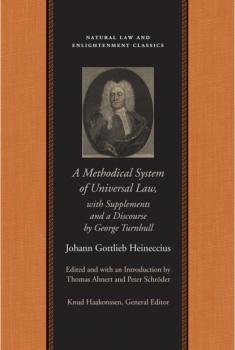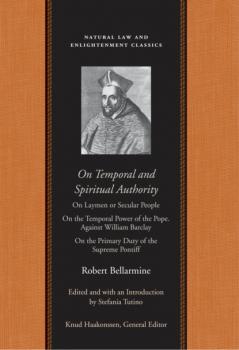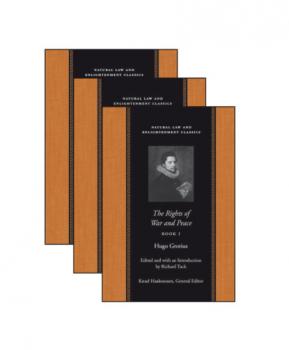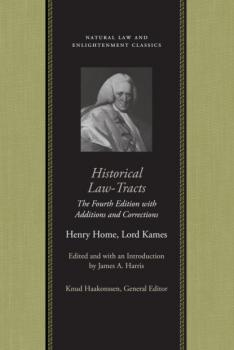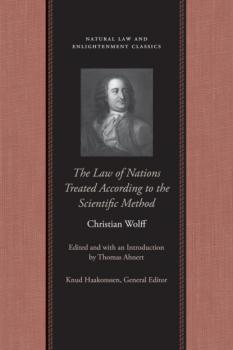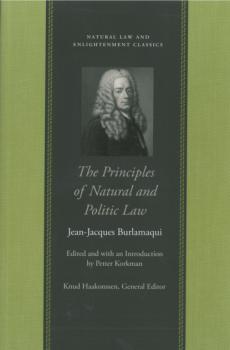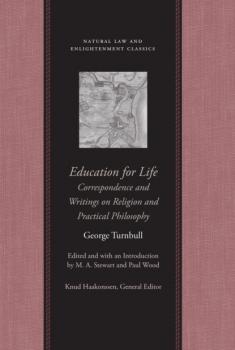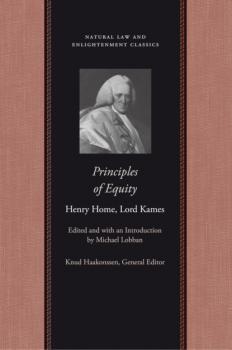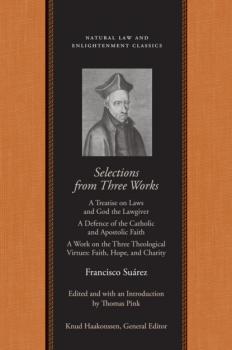Natural Law and Enlightenment Classics
Скачать книги из серии Natural Law and Enlightenment ClassicsA Methodical System of Universal Law
George Turnbull’s eighteenth-century translation of A Methodical System of Universal Law was his major effort to convey continental natural law to Britain, thus making Heineccius’s natural jurisprudence more accessible to English-speaking audiences. Turnbull includes extensive comments on Heineccius’s text and also presents his own philosophical work, A Discourse upon the Nature and Origin of Moral and Civil Laws.Johann Gottlieb Heineccius (1681–1741) studied theology at Leipzig and later law at the newly founded (1694) University of Halle, where he became a pupil of Christian Thomasius.Thomas Ahnert is a Lecturer in History at the University of Edinburgh, Scotland.Peter Schröder is Senior Lecturer in the History Department at University College, London. Please note: This title is available as an ebook for purchase on Amazon, Barnes and Noble, and iTunes.
On Temporal and Spiritual Authority
Robert Bellarmine was one of the most original and influential political theorists of his time. His writings present coherent definitions of the nature and aim of temporal authority and its relationship to spiritual authority.This fresh translation will be interesting to a wide readership of both scholars of political thought and the educated general public.Robert Bellarmine (1542–1621) was a Jesuit cardinal.Stefania Tutino is a Professor of History and Religious Studies, University of California, Santa Barbara. Please note: This title is available as an ebook for purchase on Amazon, Barnes and Noble, and iTunes.
Historical Law-Tracts
Historical Law-Tracts is one of the earliest contributions to the Scottish Enlightenment project of a historical science of society. Henry Home, Lord Kames (1696–1782), was an influential Scottish juEAe, a prolific man of letters, and one of the leading figures of the Enlightenment in Scotland, and his goal in this work is to show the study of law as a genuinely scientific inquiry and not a mere collection of facts for the lawyer to memorize. He deployed a large range of ancient, medieval, and early-modern sources to trace the development of law and to explain that development in terms of interactions between principles of human nature and political, economic, and social circumstance. He applied this method in substantial and influential treatments of criminal law and the law of property and also to a diverse range of issues, specifically in Scots law. One of Kames’s principal objectives was to expose and discredit the continuing influence of feudal principles in eighteenth-century Scots law and, as such, Historical Law-Tracts can be read as a manifesto for a modern, commercial, Scotland. The work found an international readership as well, especially in America, where it was read as an object lesson in understanding the role of law in a free society.In Historical Law-Tracts, Kames combined the natural law framework that underlies his Essays on the Principles of Morality and Natural Religion with the “conjectural,” or philosophical, approach to history that would receive its fullest treatment in his Sketches of the History of Man to offer a history of law as a history of the progress of mankind from savage to civil society.The Liberty Fund edition supplements Kames’s original text with a new introduction providing historical context and biographical information, expansion of Kames’s footnotes to explain the often rather obscure system of reference used in the book, translation of the Latin passages, and explanatory annotations relating to important changes that Kames made to the text, including variant readings from earlier editions.James A. Harris is Professor of the History of Philosophy at the University of St. Andrews, Scotland. He is the author of Hume: An Intellectual Biography and Of Liberty and Necessity: The Free Will Debate in Eighteenth-Century British Philosophy. He is the editor of the Liberty Fund edition of Kames’s Sketches of the History of Man.
The Law of Nations Treated According to the Scientific Method
Christian Wolff’s The Law of Nations is a cornerstone of eighteenth-century thought. A treatise on the philosophy of human action, on the foundations of political communities, and on international law, it influenced philosophers throughout the eighteenth-century Enlightenment world. According to Knud Haakonssen, general editor of the Natural Law and Enlightenment series, “before Kant’s critical philosophy, Wolff was without comparison the most influential German thinker for several decades as well as a major European figure.”One of the most striking features of The Law of Nations is Wolff’s single-minded dedication to what he calls the “scientific method.” Though different from what we understand by that today, Wolff’s method still focuses on the illumination of truth via a step-by-step, logical examination of what is already known in order to explain what is unknown. As such, The Law of Nations is Wolff’s triumphant synthesis of his scientific method and his observations regarding the operations of nations. It examines the full gamut of national functions: what duties nations have to themselves and to each other, how national ownership should be viewed, how treaties should be formed, and how nations should act in both war and peace.Though Wolff’s contemporaries in authority did not always accept his ideas—he was banished from the lands of the king of Prussia for seventeen years for his radical notions regarding moral obligation and human free will—his influence ultimately spread across Europe, shaping philosophical study in many German, Dutch, and Scandinavian universities especially.The Liberty Fund edition of The Law of Nations is the first in English since the 1934 translation by Joseph H. Drake. Thomas Ahnert has revised and corrected that translation for readability and accuracy and has also added footnotes that explain the many references and technical terms Wolff uses throughout the text.Thomas Ahnert is Reader and Head of History at the University of Edinburgh, Scotland. Among his publications are The Moral Culture of the Scottish Enlightenment, 1690–1805, an edition of Thomasius’s Institutes of Divine Jurisprudence, and Religion and the Origins of the German Enlightenment.
The Principles of Natural and Politic Law
Born in 1694, Jean-Jacques Burlamaqui helped transform the modern tradition of natural law and convey it to new generations.Jean-Jacques Burlamaqui (1694–1748) was a Swiss jurist.Petter Korkman is a Fellow at the Helsinki Collegium for Advanced Studies and is a Postdoctoral Researcher in Philosophy at the Academy of Finland. Please note: This title is available as an ebook for purchase on Amazon, Barnes and Noble, and iTunes.
Vindiciae Gallicae and Other Writings on the French Revolution
Vindiciae Gallicae was James Mackintosh’s first major publication, a contribution to the debate begun by Edmund Burke’s Reflections on the Revolution in France. The success of Mackintosh’s defense of the French Revolution propelled him into the heart of London Whig circles. Following the September 1792 massacres Mackintosh, along with other moderate Whigs, revised his opinions and moved closer to Burke’s position. The Liberty Fund edition also includes Mackintosh’s Discourse on the Law of Nature and Nations, Letter to William Pitt, and On the State of France in 1815.James Mackintosh (1765–1832) was a prominent Scottish Whig.Donald Winch is Research Professor in the School of Humanities at the University of Sussex and a Fellow of the British Academy. Please note: This title is available as an ebook for purchase on Amazon, Barnes and Noble, and iTunes.
Education for Life
George Turnbull belongs with a group of early Scottish Enlightenment thinkers, including Francis Hutcheson, who found their native Calvinism too repressive. They sought to relocate religion within a context of reason and science and to establish a tolerant and humane ethic upon values rooted in classical ideals.In a distinctive voice, Turnbull presented natural-law theory “scientifically,” harnessed the arts to promote moral and civil virtue, and extolled reason as the foundation of liberty. The works in this volume exhibit the close interrelations between these concerns and show him as a paradigmatic “Enlightenment” figure. This extremely rare material includes two Aberdeen graduation theses, three tracts on religion, various writings on education and art, and, for the first time in print, the correspondence of Turnbull.George Turnbull (1698–1748) was born in Scotland and ordained into the Church of England in 1739. A key figure in the Scottish Enlightenment, he taught moral philosophy at Marischal College, Aberdeen, where one of his pupils was Thomas Reid, who became the main representative of the Scottish Common Sense philosophy.M. A. Stewart is Honorary Research Professor in the History of Philosophy at the Universities of Lancaster and Aberdeen.Paul Wood is Professor of History at the University of Victoria.Please note: This title is available as an ebook for purchase on Amazon, Barnes and Noble, and iTunes.
Principles of Equity
Henry Home, Lord Kames, was the complete “Enlightenment man,” concerned with the full spectrum of human knowleEAe and its social use. However, as a lawyer and, after 1752, as a juEAe on the Court of Session in Edinburgh, he made many of his most distinctive contributions through his works on the nature of law and legal development.Principles of Equity, first published in 1760, is considered his most lasting contribution to jurisprudence and is still cited. In his jurisprudence, Kames specifically sought to explain the distinction between the nature of equity and common law and to address related questions, such as whether equity should be bound by rules and whether there should be separate courts of law and equity.Beginning with a general introduction on the rise and nature of equity, Principles of Equity is divided into three books. The first two, “theoretical,” books examine the powers of a court of equity as derived from justice and from utility, the two great principles Kames felt governed equity. The third book aims to be more practical, showing the application of these powers to several subjects, such as bankrupts. Kames drew his illustrations of the principles of equity from the case law of the Court of Session as well as the English Chancery, both because he felt that the rules of equity must be the same in every country where law was cultivated, and because he hoped his work might promote a closer union between the law of the two kingdoms. Principles of Equityis significant as an example of the approach of an Enlightenment thinker to practical legal questions and as an early attempt to reduce law to principles. Kames himself saw this as his most important work, and scholars both of his theory and of the broader Scottish Enlightenment will find it gives essential insights into the thought of this central figure. There is evidence that this book was well known in the formative years of the United States and that both Benjamin Franklin and Thomas Jefferson were familiar with Kames’s treatise.Henry Home, Lord Kames (1696–1762) was one of the leaders of the Scottish Enlightenment.Michael Lobban is Professor of Legal History at Queen Mary, University of London. Please note: This title is available as an ebook for purchase on Amazon, Barnes and Noble, and iTunes.
Selections from Three Works
Francisco Suárez (1548–1617) was the greatest metaphysician and moral theorist of sixteenth- and seventeenth-century scholasticism. Suárez is of particular importance as a theorist of natural law and of rights, for his work combines expertise in moral theory with a mastery of civil and ecclesiastical jurisprudence and a sophisticated theory of the human person.The bulk of the selections in this volume are from A Treatise on Laws and God the Lawgiver (1612), “one of the major works of scholastic moral and legal theory,” writes volume editor Thomas Pink. In the Treatise, working within the framework originally elaborated by Thomas Aquinas, Suárez presented a systematic account of human moral activity in all its dimensions, synthesizing the entire scholastic heritage of thinking on this topic and identifying the key issues of debate and the key authors who had formulated the different positions most incisively. Then he went beyond this heritage of authorities to present a new account of human moral action and its relationship to the law.The second selection is from A Defence of the Catholic and Apostolic Faith (1613), a treatise on the errors of Anglicanism and, in particular, on the errors of King James I in relation to the power of the king in temporal matters and the power of the pope to intervene in the cause of religion. The selections in the final section, A Work on the Three Theological Virtues (1621), are taken from Suárez’s accounts of faith and love, and they concern the conversion of unbelievers and the conditions of a just war.The translations in this volume were originally published by the Carnegie Endowment for International Peace. Now republished with a new introduction, revisions to some of the existing notes, and additional notes, these selections are again available in English for those interested in the ethical and metaphysical foundations of political authority and the right to liberty. The texts are of special interest to historians of religious liberty, toleration, and coercion as a classic account of the coercive authority in matters of faith and religious practice of the Catholic church.Thomas Pink is Professor of Philosophy at King’s College London. Some of his publications include Free Will: A Very Short Introduction and The Will and Human Action: From Antiquity to the Present Day.Please note: This title is available as an ebook for purchase on Amazon, Barnes and Noble, and iTunes.
